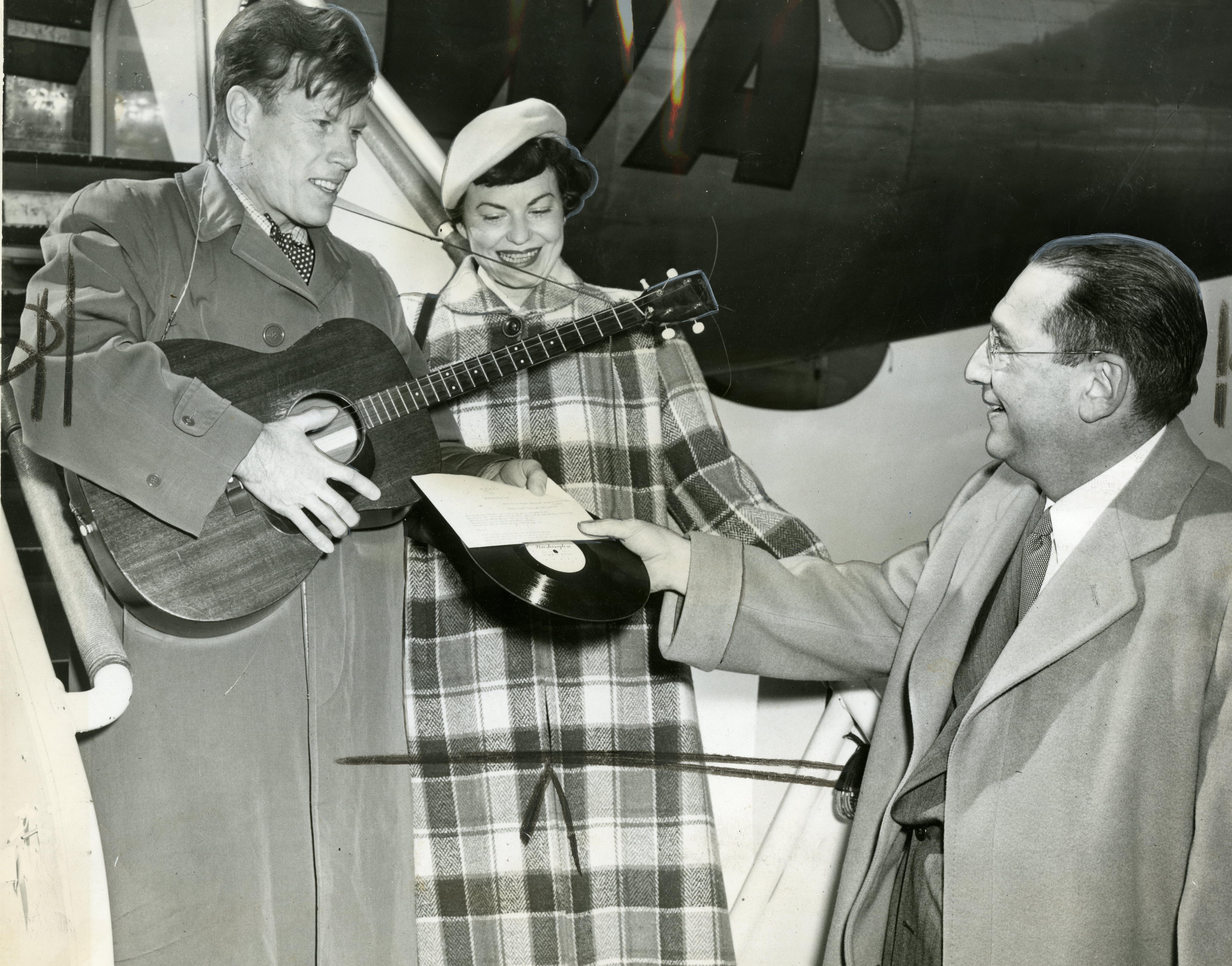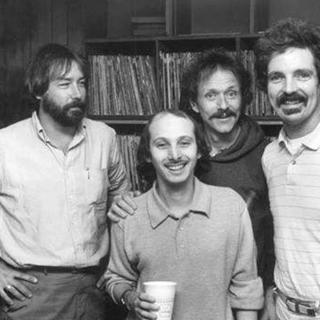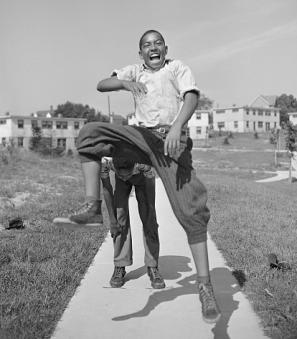Why You've Probably Never Heard Washington's "Official" Song
What songs come to mind when you think of Washington, D.C.? Maybe Go-go music, or patriotic Sousa marches? Then of course there’s the “official” song, that instantly recognizable classic— “Washington,” by Jimmie Dodd (Yes, the composer is the same grown man who went on to lead the Mouseketeers in the original “Mickey Mouse Club” in 1955).
Doesn’t ring a bell? Don’t worry, you’re not alone, but we’ll get to that.
The song came into being in 1951, when Washingtonians felt a deep musical void. James H. Simon, a TV and radio salesman native to Georgetown, related his plight of having to attend business conferences and feeling left out each time all the state songs were played.[1] “It’s almost a contest. The Texans even bring guns to shoot off when they sing ‘The Eyes of Texas Are Upon You.’”[2]
On Jan. 17, 1951, his letter to the editor bemoaning the state of things was published in The Washington Post:
I have become quite used to taxation without representation, but I am getting quite tired of posing as an adopted son and using Maryland or Virginia as my excuse for being born in Washington. Why don’t we have a song representing the Nation’s Capital? The only one all of us know is ‘Hail to the Redskins,’ and while it is a good song, it is certainly not representative of all of the great things that our city stands for.”[3]
Thus, Simon proposed a solution: a nationwide “Song for Washington” contest (sponsored by Motorola, Simon’s wholesale dealer) to find an anthem worthy of the Nation’s Capital. The Washington Post jumped on the idea the very same day with an editorial endorsement.
The contest suggested by Mr. Simon is a constructive idea which, in addition to being a lot of fun, should serve to kindle community spirit. We congratulate Mr. Simon and the Motorola Co. on their enterprise…For whatever song is chosen should be a good one, sprightly and original, that captures the spirit of the beautiful Capital. Surely there are many embryo Francis Scott Keys along the Potomac of today who will want to try their hand at a composition which Washingtonians, both native and adopted, can sing with gusto.”[4]
And so, the newspaper was peppered with publicity for the contest over the next several weeks. Famous conductors, composers, and arrangers were selected as judges,[5] and the government even got involved. With bipartisan sponsorship, members of the Senate District Committee introduced a joint resolution calling on “all civic groups and organizations” to support the contest and “Other endeavors looking toward the selection of an official song for Washington.”[6]
Along with this official endorsement, a tide of Motorola advertisements called all amateurs and professionals to write their own songs or set lyrics to a public domain tune for a chance at the first prize: $1,000 plus any royalties the song made (four runners up got Motorola TV sets). The deadline for submission was, of course, George Washington’s birthday.[7]
In the weeks that followed, submissions flowed in from every state in the Union—plus Alaska, Canada, Mexico, Puerto Rico, Cuba, and as far away as Egypt. Out of a total of 3,628 songs, the “embryo Francis Scott Key” selected was not a native Washingtonian, but an Ohioan, transplanted to Hollywood.[8]
As Jimmie Dodd told it, James Simon called him with the news while he was still half asleep.
“‘This is Jimmy Simon.’ The man says. ‘You’d be glad if I told you you won fifth prize, wouldn’t you?’
I don’t know I was sleepy, so I said, ‘Yah, sure.’
‘Well,’ said Jimmy, ‘you won the darned thing!’”[9]
Dodd, who had been to D.C. only three times before, now returned to great fanfare and excitement.
“Gee, it was wonderful to see that Monument when we came over the city,” he told the Evening Star after he landed. “How did I write the song? I went to a library to read about Washington and I prayed for the lyrics.”[10]
The lyrics, marked on the score to be sung “brightly,” are as follows:
Washington, the fairest city in the greatest land of all,
Named for one, our country’s father who first answered freedom’s call,
God bless our White House, our Capitol, too,
And keep ever flying the Red, White and Blue,
Grandest spot beneath the sun is Washington,
Oh, the cherry blossoms bring a lot of joy each spring,
And the statue of Abe Lincoln greets your eye,
When parades pass in review down Pennsylvania Avenue
Ev'rybody lifts their voices to the sky!"[11]
From there, the words could be repeated as needed. Washington Post reporter Melvin Altshuler marveled at the song's versatility: “Bright and sprightly though it is...his song...can be sung as a march or solemnly in hymn-time.”[12] The song’s arrangement clearly showcases its many facets, transitioning from the rousing, march-like opening, to the leisurely interlude about Cherry Blossoms (marked on the score as “Patter”), to the somber yet stirring finale.
Listen to the timeless classic:
Once he arrived in Washington, Dodd made a few changes to the lyrics that never made it into the recordings or sheet music. The word “everybody” in the last verse was replaced with “all the people” to please grammarians with proper pronoun-antecedent agreement.[13] He also composed a new verse with the D.C. motto “Justice for All” and the official flower, the American Beauty Rose.[14] The exact phrasing of this inspired addition is, alas, lost to history.
Described as “a relaxed chap,” Dodd appeared at countless celebratory luncheons and on radio programs while in the District—during one interview he actually chewed gum.[15] Orchestras and D.C. schools received copies of the sheet music, and “Washington” was played by local DJs that very weekend. The song was set to open the 1951 Ice Follies at Uline Arena, and an arrangement of it was even performed by the National Symphony Orchestra at a concert sponsored by the Evening Star.[16]
Dodd was presented with a record of his song and a framed copy of an official proclamation by the D.C. Commissioners, which declared March 19, “Song for Washington” day. There was a clause in the proclamation to officially “urge and recommend to the citizens of the District of Columbia that they adopt the prize-winning song ‘Washington’ as the song of the District of Columbia.”[17]
Dodd thanked them and flew back to California, the proud composer of the official song of a city 3,000 miles away from his home. That was that. Or so it seemed.
Not so fast. Almost immediately, Dodd’s “official” song of Washington was met with mixed reviews in D.C. A couple of people liked the new song, but there were quite a few disappointed letters to the editor in The Washington Post…
It seems to be it reaches its lyric peak with the line ‘Everybody lifts their voices to the sky.’ I suspect that Mr. Jimmie Dodd…is secretly connected with the Virginia Department of Highways. Could anyone else be the author of the words ‘Do not cross solid line when on your side?’”[18] -R.F.D., Falls Church, VA
Is it [the melody] ‘stirring, inspiring,’ as called for in the original Motorola ad which initiated the contest? We do not think so. The lyrics are trite and commonplace…they certainly do not adequately reflect the love for and pride in a city like Washington which a native or long-time resident would feel.”[19] -Two Readers, Falls Church, VA
And, perhaps most presciently:
The Commissioners cannot proclaim a bad song into popularity.”[20] -Ronald King, Washington
The Association of Oldest Inhabitants and the Society of Natives each insisted that they would shun Dodd’s “Washington” and continue to consider a tune of the same title from 1920 as their official song.[21]
However, perhaps the most damning assessment of Dodd’s tune was resounding indifference. It never got much play and, within a few years of its debut, almost completely faded from the consciousness of Washingtonians.
Before too long, some of the D.C. Commissioners had second thoughts about their decision. In 1956, when a song called “The District of Columbia Is My Hometown” by James L. Dixon (which had been one of the 3,267 losers of the 1951 contest) rose to popularity, several Commissioners pushed to name it as Washington’s official song.[22] And so, just five years after parading Jimmie Dodd around town, they were in the strange position of looking for some sort of loophole to knock “Washington” from its “official” position.
At first daunted by their 1951 proclamation, they eventually determined that they had only “recommended” the adoption of Dodd’s song, not actually made it official. So, the title of “Official Song of Washington” was still technically up for grabs.
Suggestions poured in. The song called “Washington” from 1920 was among the contenders, along with a few other oldies like “Washington, Fair Capital City,” “Washington Rhumba,” and “To Washington We Sing.”[23]
Dodd’s song would have been reconsidered, but the director of the Metropolitan Police Band noted that after a few performances at the time, “It just dropped dead”[24] and “admitted he didn’t even have a copy of the piano music for it and had been unable to find a recording of it locally.”[25]
As for Dixon’s song, “The District of Columbia Is My Hometown,” Commissioner David B. Karrick insisted that “any lyrics containing the words, ‘District of Columbia,’ would be virtually unsingable.”[26] (For the record, Dixon did not seem phased by this decision. He wanted to let the now forgotten tune “stand on its own feet. If it can’t, let it go down the drain”).[27]
It was suggested that a public hearing be held so that D.C. citizens could vote on various songs, but the Commissioners kept stalling on any formal decision, and in the end, no new song was selected.
Maybe they realized, as Commissioner Karrick pointed out, that such a governing body has “no power to adopt an official song for the District.”[28]
So, after all that rigamarole, D.C. still doesn’t really have a song... Ideas, anyone?
Footnotes
- ^ Simon, James H. "A Song for Washington." The Washington Post (1923-1954), Jan 17, 1951. https://library.access.arlingtonva.us/login?url=https://search-proquest….
- ^ "Simon Wants a Song of D.C., the Town He Loves Best: Simon Starts Song Contest." The Washington Post (1923-1954), Jan 18, 1951. https://library.access.arlingtonva.us/login?url=https://search-proquest….
- ^ Simon, James H. "A Song for Washington." The Washington Post (1923-1954), Jan 17, 1951. https://library.access.arlingtonva.us/login?url=https://search-proquest-com.library.access.arlingtonva.us/docview/152333620?accountid=57895.
- ^ "Singing of Washington." The Washington Post (1923-1954), Jan 17, 1951. https://library.access.arlingtonva.us/login?url=https://search-proquest….
- ^ Altshuler, Melvin, Post Reporter. "Official Washington Song Selected in Big Contest: Song for D.C. is Selected." The Washington Post (1923-1954), Mar 17, 1951. https://library.access.arlingtonva.us/login?url=https://search-proquest….
- ^ “Four Senators Urge Support Of Song-for-Washington Contest.” The Washington Post (1923-1954). 06 Mar 1951: 11.
- ^ "Display Ad 8 -- no Title." The Washington Post (1923-1954), Jan 23, 1951. https://library.access.arlingtonva.us/login?url=https://search-proquest….
- ^ “NOW…thanks to everyone, there IS a Song for Washington!” Evening Star, March 18, 1951: 34, accessed July 02, 2019, https://infoweb.newsbank.com/resources/doc/nb/image/page/v2:13D5DA85AE0….
- ^ "Mr. Dodd Comes to the Town about which He Wrote Song: Song Contest Winner Reaches Washington." The Washington Post (1923-1954), Mar 18, 1951. https://library.access.arlingtonva.us/login?url=https://search-proquest…
- ^ “Symphony to Present District’s Own Song.” Evening Star, March 18, 1951: 6, accessed July 02, 2019, https://infoweb.newsbank.com/resources/doc/nb/image/v2:13D5DA85AE05A305…@?p=WORLDNEWS.
- ^ Altshuler, Melvin, Post Reporter. "Official Washington Song Selected in Big Contest: Song for D.C. is Selected." The Washington Post (1923-1954), Mar 17, 1951. https://library.access.arlingtonva.us/login?url=https://search-proquest….
- ^ Ibid.
- ^ "Jimmy Dodd, Songster, Visits Schools Today." The Washington Post (1923-1954),Mar 21, 1951. https://library.access.arlingtonva.us/login?url=https://search-proquest….
- ^ “Symphony to Present District’s Own Song.”Evening Star, March 18, 1951: 6.
- ^ Mr. Dodd Comes to the Town about which He Wrote Song: Song Contest Winner Reaches Washington." The Washington Post (1923-1954), Mar 18, 1951.
- ^ Altshuler, Melvin, Post Reporter. "City Observes Today as its Own-Song Day." The Washington Post (1923-1954), Mar 19, 1951. https://library.access.arlingtonva.us/login?url=https://search-proquest….
- ^ Altshuler, Melvin, Post Reporter. "Official Washington Song Selected in Big Contest: Song for D.C. is Selected." The Washington Post (1923-1954), Mar 17, 1951. https://library.access.arlingtonva.us/login?url=https://search-proquest….
- ^ R.F.D, Falls Church, VA. "Letter to the Editor 2 -- no Title." The Washington Post (1923-1954),Mar 21, 1951. https://library.access.arlingtonva.us/login?url=https://search-proquest….
- ^ Two Readers. "Song for Washington." The Washington Post (1923-1954), Mar 21, 1951. https://library.access.arlingtonva.us/login?url=https://search-proquest….
- ^ King, Ronald. "Letter to the Editor 1 -- no Title." The Washington Post (1923-1954),Mar 21, 1951. https://library.access.arlingtonva.us/login?url=https://search-proquest….
- ^ “New Washington Song Not Theirs, Natives Say.” Evening Star, March 27, 1951: 14, accessed July 03, 2019, https://infoweb.newsbank.com/resources/doc/nb/image/v2:13D5DA85AE05A305…@?p=WORLDNEWS.
- ^ McLean, Hector. “Commissioners Are About to Select ‘Our Song.’” Evening Star, December 02, 1956: 37, accessed July 02, 2019, https://infoweb.newsbank.com/resources/doc/nb/image/v2:13D5DA85AE05A305…@?p=WORLDNEWS.
- ^ Lindsay, John, Staff Reporter. "Commissioners Seek Harmonious Way to End Discord on Washington's Song." The Washington Post and Times Herald (1954-1959), Dec 02, 1956. https://library.access.arlingtonva.us/login?url=https://search-proquest….
- ^ McLean, Hector. “Commissioners Are About to Select ‘Our Song.’” Evening Star, December 02, 1956: 37.
- ^ "City Fathers Out of Tune Over Home-Town Song." The Washington Post and Times Herald (1954-1959), Nov 28, T. https://library.access.arlingtonva.us/login?url=https://search-proquest….
- ^ Ibid.
- ^ McLean, Hector. “Commissioners Are About to Select ‘Our Song.’” Evening Star, December 02, 1956: 37.
- ^ Ibid.




![“The restored Lincoln Theatre, once a premier African-American entertainment venue, Washington, D.C.” (Photo Source: The Library of Congress) Highsmith, Carol M, photographer. The restored Lincoln Theatre, once a premier African-American entertainment venue, Washington, D.C. United States Washington D.C, None. [Between 1980 and 2006] Photograph. https://www.loc.gov/item/2011636050/. “The restored Lincoln Theatre, once a premier African-American entertainment venue, Washington, D.C.” (Photo Source: The Library of Congress) Highsmith, Carol M, photographer. The restored Lincoln Theatre, once a premier African-American entertainment venue, Washington, D.C. United States Washington D.C, None. [Between 1980 and 2006] Photograph. https://www.loc.gov/item/2011636050/.](/sites/default/files/styles/crop_320x320/public/17856v.jpg?itok=KiWAaHRq)
![Sketch of the mythical fuan by Pearson Scott Foresman. [Source: Wikipedia]](/sites/default/files/styles/crop_320x320/public/2023-10/Goatman_Wikipedia_Faun_2_%28PSF%29.png?h=64a074ff&itok=C9Qh-PE1)












